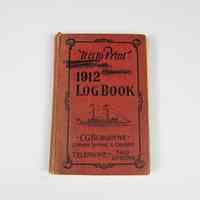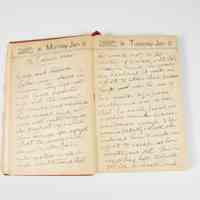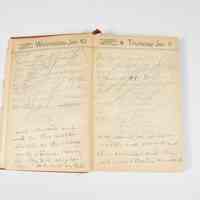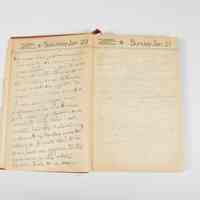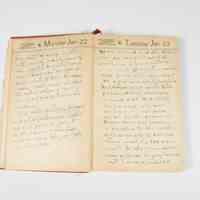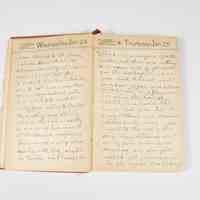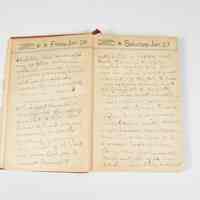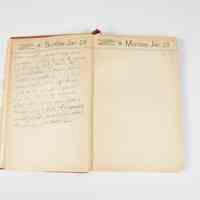1912 Log Book – Daily Journal Entries
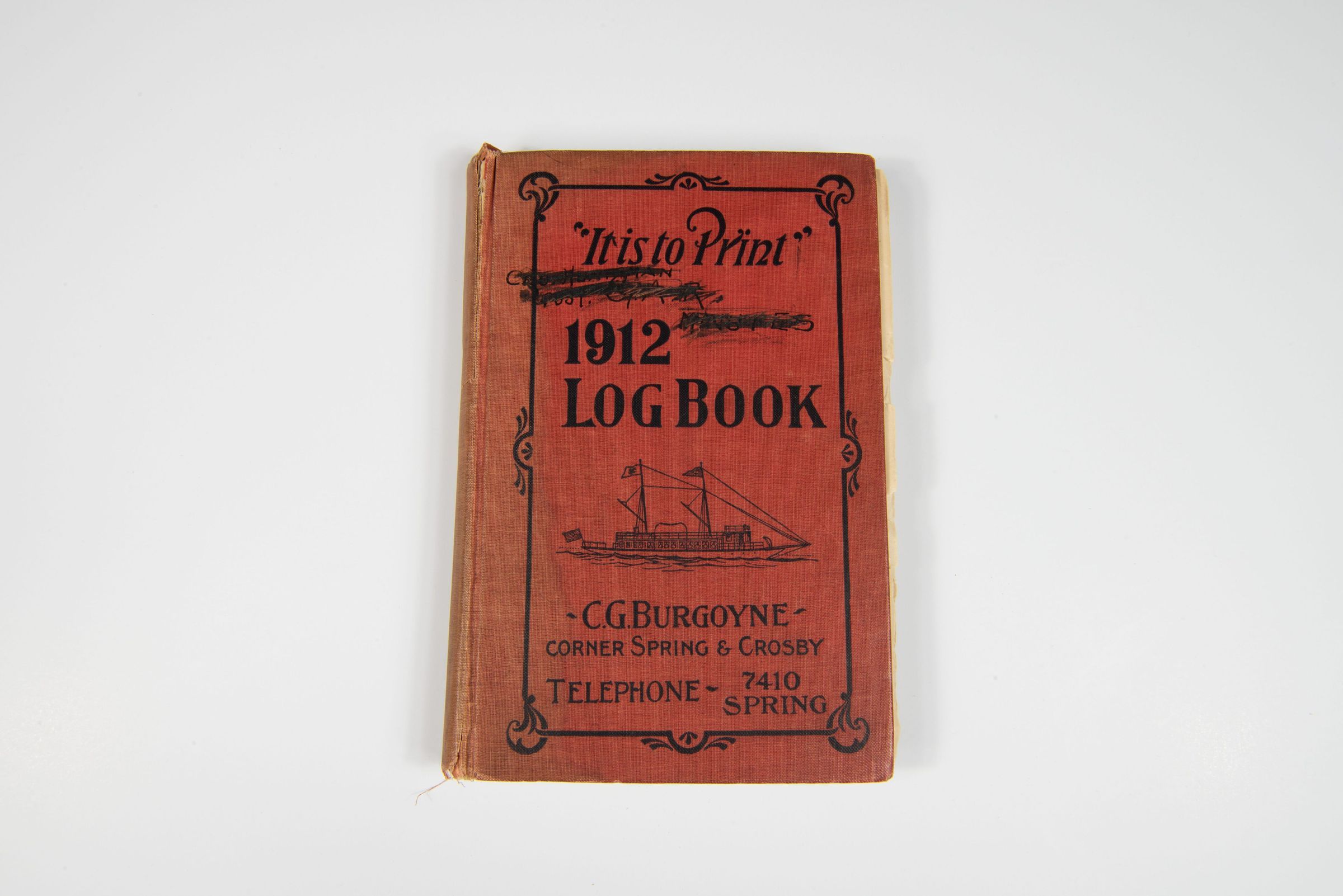
This log book is from the early 20th century and provides insight into the daily experiences of the writer. It documents both personal reflections and broader historical moments, potentially making it a valuable historical artifact. It is one of the main surviving sources in which Latimer described the experiences of his parents as fugitives from slavery, and his own biography up to the point when he started working for Thomas Edison’s firm.
Latimer Family Papers (1870-1996 ) [QPL Full Collection]
Monday January 8 A Colored Man George and Rebecca Lalor [a pseudonym for “Latimer”] were slaves in Virginia. They had met and loved each other and with consent of master and mistress had married and all was well until there was the prospect of a child then Rebecca realized that the coming child would be like father and mother a slave and she determined that Tuesday January 9 she would not be the mother of a slave. With this idea in mind she forced her husband to make an effort to attain their freedom. George was the son of his master by a brown mother and was so fair that he easily passed as a white man. As Rebecca was brown enough to be unmistakably colored she induced him to make an effort to escape as her master, and with this in view they left Norfolk Virginia as master and Wednesday January 10 [[moved that committee of four or more be appointed to consider propositions for the advancement of the interests of the members of the G.A.R. and their families and to formulate means to that end. Meeting for A.W.F.]] and servant and in this relation started on the steamer for Baltimore. Arriving there they took cars [i.e., the railroad] for New York and in that Thursday January 11 [[The regular encampment of George Huntsman Post No. 50 G.A.R. Dept. of N.Y. took place at the Armory Building Flushing on the evening of June 18, 1917. The following officers and comrades were present. Com. R.W. Carman S.V. Phillip Knighton Off of Day Thos. Burke Adj. L.H. Latimer A.D.C. A.E. Sholes --Comrades— John Downey Wm McCabe]] way travelled on north as master and servant and this continued until they had reached Boston Massachusetts. Saturday January 20 By some means this master learned of his arrival and immediately started to make him return. For this purpose the master came to Boston and made an effort to have his slave arrested. George was seized and imprisoned in the Boston jail and efforts were being made to ship him back south, but the Antislavery sentiment of Boston was too strong to permit this to be done, and an appeal to the governor of the state in addition to a large Sunday January 21 [[Committee met at Armory Sunday Aug 13, 1917. Carman McCabe Sholes Heffernan Burke Latimer were present. Communications read. It was decided to send out a card inviting all Civil War veterans to be present at a meeting to be held at the armory Flushing on the evening of the 20’’ of August. Col. Sholes authorized to print cards for this occasion.]] Monday January 22 Payment of each by the antislavery society caused his master to retreat and leave him free. No attempt was made to take Rebecca back south and she had the satisfaction of having her first child born in freedom. Three other children followed and while father and mother were so poor as only to be the owners of themselves and children, they we[re] happy in being free. Tuesday January 23 Years passed and the children grew up, Margaret went to work in a family. George was sent to a farm school and from there bound out to a farmer in Springfield. William also went to the farm school and was bound out to a hotel keeper and all were well for several years until in the course of time Howard [pseudonym for himself, Lewis Howard Latimer] became a burden to the mother who was left to care for him and he too was sent to the farm school from whence he was bound out for a while, but Wednesday January 24 soon returned to the farm school. About this time William returned to the school and suggested that they go back to Boston. To think was to act and soon two colored boys and one white boy started to walk the eighty four miles to Boston. By walking and stealing rides on the railroads they in course of time arrived at Boston and surprised their mother who was living with their sister in Boston on Phillips St. Thursday January 25 This was a surprise for the mother, but there was nothing to do now but to get work for the two boys. This was done and Howard went in a law office and William In a family and they were here when the Civil War started. Then hearing that George had gone into the army William and Howard enlisted in the navy and served to the end of the war. Then William went away from home and Howard who was quite artistic got employment in the office of a Patent Friday January 26 Soliciting firm as an office boy at three dollars a week. He remained here for eleven years, and learned all kinds of mechanical drawing by his own efforts, meanwhile he had got married and moved to Bridgeport, Conn. Here he entered into the employ of an Electric Light firm and as this art was just commencing he had the opportunity of learning every branch of this art and soon had gone to London England to Saturday January 27 Establish a factory and teach the men to make electric lamps. This he did in nine months, and returned to the U.S. to find every avenue closed and the prospect of poverty before him and his wife. Just then he was sent for by the Edison Electric Light Co. and soon was established with them as a mechanical draughtsman. Now his color began to be a drawback to him. Every new workman who came into the office saw for the first time, a colored Sunday January 28 Man making drawings, and as often as they came to work in the office they tried to pretend that he could not do their work, but he had had such long experience and was so well posted in all kinds of drawing that they soon were forced to acknowledge his exceeding ability which was far above the average at that time.
Monday, January 8 "Dr. Colonel Man" George and Rebecca Latimer were slaves in Virginia. They had not only loved each other but under the consent of their master and mistress had married and were doing well until there was the prospect of a child. Then Rebecca realized that the coming baby would be like its father and mother, and she determined that her child would not be born into slavery. Tuesday, January 9 She would not be the mother of a slave. With this idea in mind, she forced her husband to make an effort to attain their freedom. George Latimer was the son of his master by a brown mother and was so fair that he easily passed as a white man. Rebecca was brown enough to be unmistakably colored, so she introduced him to make an effort to escape as her master, and with this in view, they left Norfolk, Virginia to seek freedom. Wednesday, January 10 Community efforts continued for the freedom of fugitives, providing assistance through underground networks. Many were determined to find a way to secure their future in Boston. In the same day’s actions, a great number of fugitives from the South arrived in New York but had to continue moving to avoid capture. Thursday, January 11 The regular encampment of Sur. Huntington Post No. 440, Dept. of New York G.A.R., met on June 1, 1917. Several comrades were present. Captain C. J. Cameron, Adj. C. F. Kinsley, Lieut. J. Hefferman, PFC. A. Green and others. A motion was carried that documentation of comrades’ presence be recorded and honored. Saturday, January 20 Somewhere this master learned of their whereabouts and tried to reclaim them. An effort was made to have them arrested, but the sentiment in Boston was too strong to permit this to succeed. An appeal to the governor of the state resulted in a legal decision in favor of the Latimers. Sunday, January 21 Jeannette met at ordinary Sunday, August 18, 1917. Comrades Mic, Ole Sylks, Hefferman, Burke Latimer were present. Comrades discussed a planned distribution of literature for an upcoming event. Monday, January 22 Happiness is one of the greatest protections against despair, and should be nurtured in the hearts of those seeking freedom. To take life as a reality and not as a hopeless condition—this is essential for those who must fight for justice. Tuesday, January 23 Years passed and the child grew up. Margaret wrote, which was a great boon to the abolitionist movement. Her words helped awaken the conscience of many who did not understand the realities of bondage. Wednesday, January 24 As the journey continued, they made their way to Boston. There they found refuge among those who had dedicated themselves to aiding the oppressed. The Latimers were granted sanctuary and allowed to remain under the protection of abolitionist groups. Thursday, January 25 Life was a surprise for Rebecca, who had long feared what might happen to her child. But now there was hope, as the fight for abolition gained more support. The work of advocates and allies ensured that their story was not forgotten. Friday, January 26 Sketching Jim as an officer at home, declared to be someone who knew all kinds of engineering improvements. His ideas would lead to innovations that would benefit many. He traveled to pursue opportunities in education and engineering. Saturday, January 27 Later, as a teacher, he dedicated himself to educating others on their rights and freedoms. He taught men to find dignity in labor and self-reliance. Sunday, January 28 Men making drawings, and as others came to work in trade, they were encouraged to learn skills that would allow them to provide for their families. It was through perseverance that they were able to build a future free from oppression. Monday, January 29 (Blank Page with Notes in Margin: “Names Mentioned” and calculations.)
